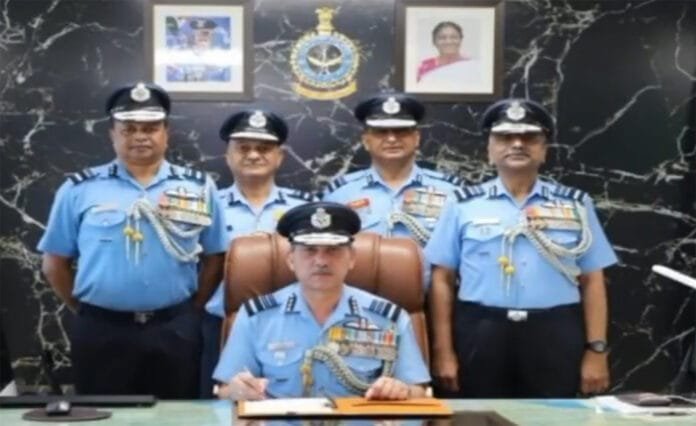INVC NEWS New Delhi – In a decisive development that underscores India’s heightened military posture following the deadly terror attack in Pahalgam, the Indian Air Force has appointed Air Marshal Narmdeshwar Tiwari as its new Vice Chief. As the country grapples with the loss of 26 civilians in a brutal assault widely attributed to Pakistan-based terrorists, the elevation of Tiwari—a native of Bihar’s Siwan district—has ignited a wave of pride, not just across his home state, but the entire nation.
Amid escalating tensions along the border, the appointment carries heavy strategic weight. It signals a shift in India’s military response framework, with the Air Force expected to play a pivotal role in counter-terror operations.
From Siwan to Strategic High Command
Born and raised in Sikalpur village, under Guthni police station limits in Siwan, Air Marshal Tiwari’s appointment marks a new chapter for a region steeped in India’s freedom struggle. The land that once gave India its first President, Dr. Rajendra Prasad, now offers a battle-hardened officer at a time when the country’s military calculus is under stress.
As news broke late Tuesday night, celebrations erupted in Sikalpur, with villagers lighting lamps, beating drums, and showering praise on the son of the soil now tasked with defending it. Locals described the moment as historic. “Now the world will see Bihar’s strength,” said one elder. Another villager echoed, “This is not just Siwan’s pride—it’s India’s shield taking shape.”
A Nation in Mourning, a Military on Alert
The backdrop to this development is grim. On April 22, terrorists opened fire in Pahalgam, a popular tourist destination in Jammu and Kashmir, killing 26 civilians in one of the worst attacks in recent years. The assault has been widely condemned across the political spectrum, with both ruling and opposition parties demanding immediate and robust retaliation.
Security agencies have pointed fingers at Pakistan, intensifying diplomatic friction and triggering a re-evaluation of border protocols. The Indus Waters Treaty, long considered a symbol of fragile peace, has reportedly been reexamined. India has signaled its intent by halting river water to Pakistan, a move seen as both symbolic and strategic.
The military brass is already on high alert, with intelligence inputs indicating potential escalations across LoC sectors. The timing of Air Marshal Tiwari’s appointment is therefore seen as critical to India’s coordinated response mechanism.
May 1: A New Chapter Begins
Air Marshal Tiwari is set to officially take charge on May 1, following the retirement of Air Marshal Sujeet Pushpakar Dharkar, who steps down after more than four decades of service. Dharkar’s departure comes amid a volatile climate, and the baton now passes to a man known for operational sharpness and deep strategic insight.
Insiders at the Ministry of Defense describe Tiwari as a “combat-seasoned leader” with an impeccable track record across critical air command sectors, including intelligence and forward operations. His presence in the top echelons of command is expected to accelerate India’s readiness in the event of cross-border provocations.
Bihar’s Role in National Defense Strengthens
Tiwari’s appointment has also sparked conversations around regional representation in national defense leadership. Bihar, long seen as a crucible of patriotism and sacrifice, is now poised to play a more direct role in strategic command.
Social media is abuzz with hashtags like #BiharInCommand and #SiwanPride, while political leaders across party lines have issued statements lauding the promotion. Bihar’s Chief Minister called it a “moment of glory for every Bihari,” while opposition leaders too hailed the development as “a proud day for Indian democracy and defense.”
Air Force Front and Center: Tactical Readiness in Focus
With growing calls for swift retribution following the Pahalgam massacre, the Indian Air Force is expected to be at the forefront of any calibrated military response. While ground intelligence operations and internal security grids remain active, air superiority is being seen as a decisive factor in counter-insurgency dynamics.
The Vice Chief’s office, now under Tiwari, will oversee a range of crucial elements—from precision strike planning, surveillance drone deployment, to logistics synchronization with ground forces. The trust placed in him reflects not just his personal credentials but also the shifting doctrine within the IAF, where flexibility, rapid response, and preemptive deterrence are key.
A Message to the World: India is Ready
As the subcontinent braces for the aftershocks of the Pahalgam tragedy, India is sending a clear message to its adversaries: the era of restraint is being redefined. The appointment of Narmdeshwar Tiwari is more than a personnel change—it’s a pivot in national defense posture.
It reflects India’s resolve to confront terrorism head-on, with leaders at every level—civilian and military—now aligned in purpose. The emergence of new leadership from states like Bihar, long perceived as underrepresented in national command structures, is a signal of broader transformation in Indian strategic thinking.
















